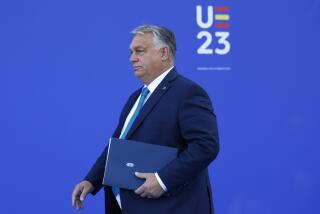The Curtain Rises: Eastern Europe, 1989 : EPILOGUE : 10 Years, 10 Months, 10 Weeks and 10 Days : With breathtaking speed, the East Bloc has been transformed. But the struggle is not over.
- Share via
As Trotsky or Mao or Che Guevara might have said in another context, the struggle continues.
Tadeusz Mazowiecki, after four months as the first non-Communist prime minister of Poland, looks as tired as he did the day he told Lech Walesa he would take the job. Walesa went to Washington and became one of three foreigners who were not heads of state to have addressed a joint session of Congress. He was given a standing ovation.
Mazowiecki went to the Kremlin for his first Warsaw Pact summit conference, flanked by his old antagonists, Gen. Wojciech Jaruzelski and Mieczyslaw Rakowski, who seemed proud to have him along.
The Hungarian prime minister, Miklos Nemeth, is only 44, but is weary also, perhaps a lame duck, and is deeply uncertain about Hungary’s economic future as a soon-to-be parliamentary democracy. Having arrived at its threshold with relative ease, the nation seems disinterested in politics and dispirited over a declining economy.
Egon Krenz has come and gone, replaced last weekend in East Berlin by Gregor Gysi, at 41 the youngest party leader in Eastern Europe. He is a defender of the rights of opposition parties and reconciled to early free elections and their probable result--the end to Communist leadership in East Germany. Erich Honecker, expelled from the party, is under house arrest and may, along with others who served with him, face formal charges of corruption.
Petar Mladenov has thrown the hard-liners off the Bulgarian Politburo and, if demonstrations in Sofia continue, may have to go soon himself. Todor Zhivkov’s 33 luxury villas have been turned over to the use of schools, youth scouting groups and medical clinics.
In Prague, Ladislav Adamec resigned as prime minister and a new government chief, Marian Calfa, 43, last Sunday formed a government with Communists in the minority. Among the new ministers are a number of the old government’s former prisoners. A deputy prime minister, Jan Carnogursky, who got out of jail only three weeks ago, will help supervise the Interior Ministry, which controls the state police. Free elections are expected in June. Milos Jakes, in a state of apparent bewilderment, wandered off beyond the sidelines and was heard no more. Gustav Husak resigned as president. Vaclav Havel, in jail this year from January to May, was regarded as his most likely successor.
How did it happen? A comment now making the rounds in Eastern Europe says it took 10 years in Poland, 10 months in Hungary, 10 weeks in East Germany and 10 days in Czechoslovakia--and when the time does come, it will take 10 hours or 10 minutes in Romania.
Did it start with Poland in January, or when the elections that showed Communists could relinquish power--would have to relinquish power--without blood in the streets? Would East Germany’s leaders have gone, and then Czechoslovakia’s, if the Hungarians had not been determined to tear down their border fence? Would any of it have happened without Mikhail Gorbachev? Or would there have been a Gorbachev without a Communist system in terminal crisis?
When news got out that the Hungarians wanted to remove the red star from atop the Parliament building, 18 companies submitted bids to do it for free. A French firm offered to buy it for $60,000. Only the French could spot a trend so fast: Fashion’s thirst for nostalgia claims a symbol of repression, hated by millions, and makes it trivial.
In truth, the red star will go without lament, because it was not trivial. In Poland, East Germany, Czechoslovakia, Hungary and Bulgaria, 90 million people lived under it for 40 years, with another 22 million in Romania still waiting. It ruined rivers, forests and lives without number, and the damage it brought cannot be calculated.
At the end of 1989, though, some accounting was about to begin, and a start on a new era of history for Eastern Europe.
More to Read
Sign up for Essential California
The most important California stories and recommendations in your inbox every morning.
You may occasionally receive promotional content from the Los Angeles Times.










